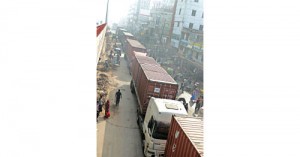Published in New Age on Thursday, 26 December 2013.
EU may review GSP facility if democratic process hampered
Experts, exporters fear
Moinul Haque

Experts and exporters fear that the European Union might take negative decision on the trade facilities Bangladesh is enjoying now in the European market in the review in July next year due to the ongoing political violence and threat to democratic process in the country.
Besides, experts said, the persistent political unrest which was disrupting the supply chain and progress of works related to work place safety and workers rights might prompt the EU to take the same course of action taken by the US in suspending generalised system of preferences.
The EU is closely monitoring the situation in Bangladesh and its decision of not to send observers for the upcoming 10th national parliamentary polls on January 5 is a bad signal to the country, they said.
‘The EU has not yet announced any decision about whether it will curtail the facilities Bangladesh is enjoying now. But, if the EU thinks that the country has failed to ensure basic criteria of democracy, it may suspend the generalised system of preferences facilities for the Bangladesh products in the European market,’ Centre for Policy Dialogue executive director Mustafizur Rahman told New Age on Tuesday.
He said the EU would not cut the GSP facility for Bangladesh right now but it would depend on the political situation in the days to come to take such decision.
Mustafizur, however, said despite the GSP facilities Bangladesh would not able to get the benefit of the privilege in the EU market, if political unrest continues.
‘A good quantity of orders will be shifted to other competitor countries due to production and supply disruption in Bangladesh,’ he added.
Shahidullah Azim, vice-president of Bangladesh Garment Manufacturers and Exporters Association, said the EU would review their decision on the trade facilities for Bangladesh considering safer work place, workers rights and political situation.
‘Their decision for not deploying observers for the upcoming pools has proved that they are not taking the prevailing political situation positively,’ he said.
Azim said, ‘If the EU cuts GSP facility for Bangladesh, exporters would have to pay duty over 12 per cent. In that case, Bangladesh would lose its competitiveness and the garment export would fall by about $7 billion.’
Bangladesh export apparel products worth more than $12.5 billion to the EU markets annually. The country exports RMG products worth over $21.5 billion each year.
Nazneen Ahmed, senior research fellow of Bangladesh Institute of Development Studies, said the EU decision of not to send observers for the upcoming polls was not a good sign, when the labour situation and work place safety in Bangladesh were under the scrutiny of the EU.
She said that the decision taken by the EU over the political situation in Bangladesh might pose risk to the country’s economy.
‘The apprehension about a negative decision on the GSP facilities for Bangladesh in the EU markets has some ground. But, I think the EU would not go for immediate decision as they also need low cost products,’ Nazneen said.
She also said that the decision would depend on how people would react after the polls in Bangladesh.
Abdus Salam Murshedy, president of Exporter Association Bangladesh, said, ‘The EU is sympathetic to Bangladesh. But, if the ongoing political problem can not be solved through democratic process, a risk of losing GSP facilities will remains.’
If the EU takes any negative decision because of political instability, Bangladesh’s exports will be hampered severely as the country’s 60 per cent of export products go to the EU markets, he said.



